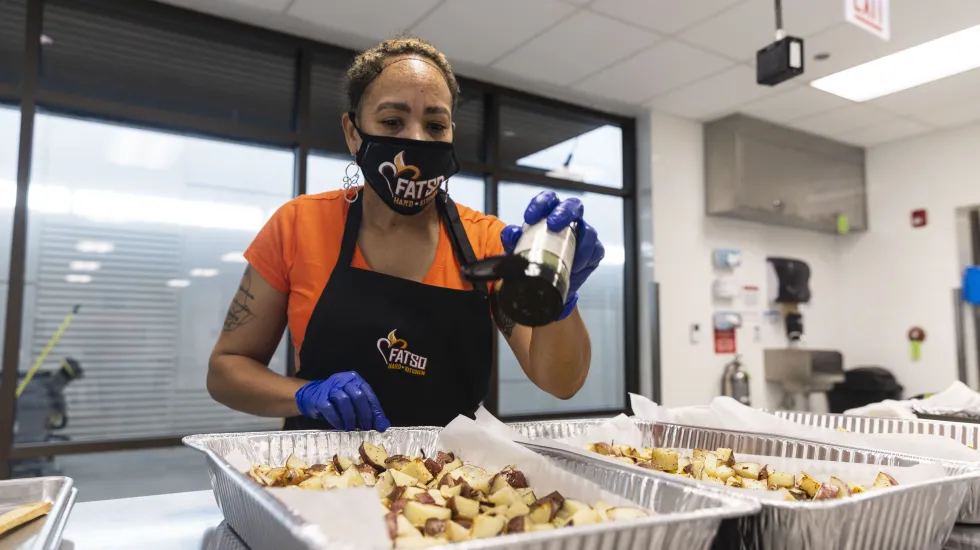
Twisted Midwestern with a Southern kiss — that’s how Wanda Gilmer describes her cuisine. Gilmer and her husband, Freddie, created Fatso Hard Kitchen in March 2020.
She’s the CEO, but she doesn’t just want to sell food. She wants to help her community.
“My grandfather was the motivating factor,” explained Gilmer. “He was born in 1919 and suffered from food insecurity. As a young girl I didn’t understand why he would make us eat everything on our plate. Now that I’m a mother, it became a mission of mine to assist those that suffer from that same disadvantage.”
Fatso Hard Kitchen is among 100 businesses operating out of The Hatchery, a food and beverage incubator at 135 N. Kedzie Ave.
The 67,000-square-foot Hatchery opened in 2018. It has 56 private kitchens and five shared kitchens, as well as storage space and loading docks.
For fledgling restaurateurs, it offers classes on entrepreneurship, technology support and help with licensing.
Natalie Shmulik, the Hatchery’s chief strategy and incubation officer, said the goal is to “create a pathway for entrepreneurs to achieve success.”

That success can be difficult to achieve. The National Restaurant Association estimates that before the pandemic, 50,000 eating and drinking establishments were closing every year (compared to about 60,000 opening every year).
“It’s our job to provide them with as much … candid information as possible to give them a very realistic perspective,” she said.
Most Hatchery businesses start by paying an hourly fee for shared kitchen space. Once they work up to using 30 to 40 hours of kitchen time weekly, they can sign a lease for a private kitchen. The incubator also offers 34 hours of free shared kitchen space each week.
Gilmer, at the Hatchery a little over a year, said the classes were a big help.
“I am an executive assistant. I knew nothing about the food industry at all,” said Gilmer. “That’s where the Hatchery comes in, with resource utilization and to get you legally set up” with food-handling certification and other things.
Last year, the incubator partnered with Dom’s Kitchen and Market in Lake View, helping entrepreneurs get their products in front of buyers who wouldn’t otherwise know about them.
According to Shmulik, about 90% of businesses now at the Hatchery are women-owned, 60% are minority-owned and 54% are owned by West Side residents.
“It’s very integral to our mission to support the West Side,” she said. “But it’s so helpful to the industry as a whole if we can make sure that there are more women-owned businesses” as well as business owned by Black entrepreneurs or other people of color, she added, “because that’s really where innovation stems from.”
That innovation was seen during the pandemic. Several businesses, like Fatso Hard Kitchen, offered free meals to organizations fighting food insecurity. That led the incubator to launch the Hatch-Made Meals grant program. Each week, the program hired Hatchery-based catering chefs to produce 500 meals that are donated to five West Side non-profits: Austin Coming Together, Breakthrough Urban Ministries, Harmony Community Cares, La Casa Norte and YWCA Metropolitan Chicago.
The Hatchery also installed a door along Lake Street, where drivers for food-delivery services can pick up orders. Delivery options was something the incubator “didn’t necessarily anticipate,” said Shmulik. “The building was really designed for manufacturing, where entrepreneurs could make their products then sell their products outside of the building.”
The delivery door is in place just in time for Gilmer’s new “Weekend Wonders” menu, which will offer two new dishes each weekend in April.

“You order by Wednesday and pick up on Saturday or Sunday,” Gilmer said. The menu will be posted a week ahead of time at www.fatsohardkitchen.com she added, and meals can be picked up or delivered.
The pandemic also forced The Hatchery to pause its Impact Culinary Training Center, a program run with Chef Rick Bayless and other top industry chefs. The three-month program offered training to South and West Side youth, followed by a paid internship.
With COVID restrictions lifting, the program will relaunch in April, with additional job training opportunities in other sectors of the food and beverage industry. The Hatchery also hopes to partner with the city for another Taste of the West Side, Shmulik said.
While The Hatchery doesn’t have a set timeframe for how long a business can remain before going out on their own, Shmulik said, the “sweet spot” is one to three years.
After that third year, Hatchery officials talk to entrepreneurs about their next steps, such as future growth, or even a brick-and-mortar site.
That’s what Gilmer wants some day. In the meantime, Fatso Hard Kitchen is creating new products, like a line of four dry rubs called “Hug Rubs.” They’re also testing several sauces.
“The pandemic allowed us to truly research and find ways to be a lucrative company,” she said. “But it’s just not about us. Our passion is love, our passion is food. Our vision is to offer flavors so households of all demographics can prepare with ease in the heart of their very own home: the kitchen.”








